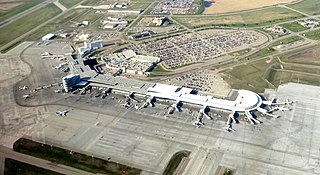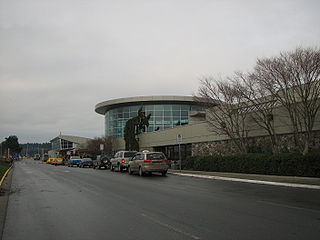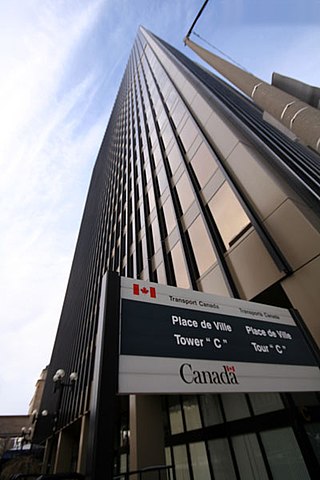Related Research Articles

Edmonton International Airport, officially branded YEG Edmonton International Airport since 2022, is the primary air passenger and air cargo facility in the Edmonton Metropolitan Region of the Canadian province of Alberta. Designated as an international airport by Transport Canada and operated by Edmonton Airports, it is located 14 nautical miles south southwest of Downtown Edmonton in Leduc County on Highway 2 opposite of the city of Leduc. The airport offers scheduled non-stop flights to major cities in Canada, the United States, Mexico, the Caribbean, Central America and Europe.
QuikAir was a small Canadian regional airline based in Calgary, Alberta, serving business travellers. QuikAir ceased its operations on October 24, 2006.

The Canada Border Services Agency is a federal law enforcement agency that is responsible for border control, immigration enforcement, and customs services in Canada.

Victoria International Airport serves Victoria, British Columbia, Canada. It is 12 nautical miles north northwest of Victoria on the Saanich Peninsula, with the bulk of the airport in North Saanich, and a small portion of the airfield extending into Sidney. The airport is run by the Victoria Airport Authority. YYJ has many nonstop daily flights to Vancouver International Airport, which is a major airport serving many global routes. Additionally, Victoria International has nonstop service to Seattle (SEA), Toronto (YYZ), Montreal, Calgary (YYC), Edmonton (YEG), and several smaller cities in British Columbia and Yukon. The airport also has seasonal nonstop service to several Mexican resort destinations. Non-stop service between Victoria and the United States decreased by 50% at the beginning of September 2019 when Delta Airlines permanently ended its three daily flights to Seattle, after which only Alaska Airlines continued to fly the route.

Regina International Airport is an international airport located in Regina, Saskatchewan, Canada, located 2 nautical miles south-west and 7 kilometres (4.3 mi) west-southwest of the city centre. It is run by the Regina Airport Authority. In 2022, it was the 16th busiest airport in Canada.

Abbotsford International Airport is located in Abbotsford, British Columbia, Canada, 2.2 nautical miles southwest of the city centre. It is the second largest airport in the Lower Mainland region of British Columbia, after Vancouver International Airport (YVR), and is in close proximity to British Columbia Highway 1, and the US border. It is located about 65 kilometres (40 mi) from downtown Vancouver.

Transport Canada is the department within the Government of Canada responsible for developing regulations, policies and services of road, rail, marine and air transportation in Canada. It is part of the Transportation, Infrastructure and Communities (TIC) portfolio. The current Minister of Transport is Anita Anand. Transport Canada is headquartered in Ottawa, Ontario.

Region of Waterloo International Airport or Kitchener/Waterloo Airport is an international airport serving the Regional Municipality of Waterloo in Woolwich, Ontario, Canada, west of Toronto. It has year round daily flights to Edmonton, Vancouver, Calgary, Orlando, Halifax, Fort Lauderdale and Kelowna through Flair Airlines and WestJet. It also has seasonal flights to Cancun through Sunwing Airlines and Flair Airlines. In 2022, the airport ranked seventh-busiest in Canada by total aircraft movements and twentieth-busiest by passenger traffic.

Bradley Air Services, operating as Canadian North, is a wholly Inuit-owned airline headquartered in Kanata, Ontario, Canada. It operates scheduled passenger services to communities in the Northwest Territories, Nunavut and the Nunavik region of Quebec, as well as southern destinations such as Edmonton, Montreal and Ottawa. It also has an interlining agreement with Air Greenland.
Lethbridge Airport, previously Lethbridge County Airport, is located 4 nautical miles south-southeast of Lethbridge, Alberta, Canada. It is 10–15 driving minutes from downtown Lethbridge, and has scheduled service to the city of Calgary, Alberta. The airport is classified as an airport of entry by Nav Canada and is staffed by the Canada Border Services Agency (CBSA) on a call-out basis from the Sweetgrass-Coutts Border Crossing. CBSA officers at this airport can handle general aviation aircraft only, with no more than 15 passengers. The airport was the site of the biennial Lethbridge International Airshow until 2023.

Erik Nielsen Whitehorse International Airport is an airport of entry located in Whitehorse, Yukon, Canada. It is part of the National Airports System, and is owned and operated by the Government of Yukon. The airport was renamed in honour of longtime Yukon Member of Parliament Erik Nielsen on December 15, 2008. The terminal handled 294,000 passengers in 2012, representing a 94% increase in passenger traffic since 2002. By 2017, this number had risen to 366,000. Air North is based in Whitehorse.

Cranbrook/Canadian Rockies International Airport is an international airport located 5 nautical miles north of Cranbrook and 20 km (12 mi) south-east of Kimberley, British Columbia, in the Canadian Rockies.

Canadian Forces Base Comox, commonly referred to as CFB Comox or 19 Wing, is a Canadian Forces Base located 2.5 nautical miles north northeast of Comox, Vancouver Island, British Columbia. It is primarily operated as an air force base by the Royal Canadian Air Force (RCAF) and is one of two bases in the country using the CP-140 Aurora anti-submarine/maritime patrol and surveillance aircraft. Its primary RCAF lodger unit is 19 Wing, commonly referred to as 19 Wing Comox.

Brandon Municipal Airport is an airport located 1.6 kilometres (1 mi) north of Brandon, Manitoba, Canada. It serves the City of Brandon, the Westman and Parkland regions of Manitoba, and eastern Saskatchewan. Brandon Municipal Airport is classified as an airport of entry by Nav Canada and is staffed by the Canada Border Services Agency (CBSA) on a call-out basis from the International Peace Garden Border Crossing.

United States border preclearance is the United States Department of Homeland Security's (DHS) practice of operating prescreening border control facilities at airports and other ports of departure located outside of the United States pursuant to agreements between the United States and host countries. Travelers are subject to immigration and customs inspections by Customs and Border Protection (CBP) officers before boarding their transportation onward to the United States. Preclearance applies to all passengers regardless of their nationality or purpose of travel. Upon arrival, precleared passengers arrive in the United States as domestic travelers, but may still be subject to re-inspection at the discretion of CBP. This process is intended to streamline border procedures, reduce congestion at American ports of entry, and facilitate travel into airports that otherwise lack immigration and customs processing facilities for commercial flights.
Charlo Airport is located 4.8 nautical miles south-southeast of Charlo, New Brunswick, Canada.

Sunwing Airlines Inc. is a Canadian low-cost airline headquartered in Toronto, Ontario. On May 1, 2023, WestJet announced that it had completed the acquisition of Sunwing Airlines.

NEXUS is a joint Canada Border Services Agency and U.S. Customs and Border Protection-operated Trusted Traveler and expedited border control program designed for pre-approved, low-risk travelers. Members of the program can avoid waits at border entry points by using reserved lanes at land crossings into Canada and the United States, by using self-serve kiosks at airports in Canada, the US and some international locations, or by phoning border officials for a marine entry. A NEXUS membership card is a valid document under the Western Hemisphere Travel Initiative (WHTI), so it can be used in place of a passport, including by air if flying between the US and Canada. However, carrying a valid passport is still recommended, in the rare event that a flight is diverted to an airport without NEXUS support.

Global Entry is a program of the U.S. Customs and Border Protection service that allows pre-approved, low-risk travelers to receive expedited clearance upon arrival into the United States through automatic kiosks at select airports and via the SENTRI and NEXUS lanes by land and sea. As of May 4, 2018, Global Entry was available at 53 U.S. airports and 15 preclearance locations. By April 2018 more than five million people were enrolled in Global Entry and approximately 50,000 new applications for the program were being filed each month.

Kingston Norman Rogers Airport or YGK Airport, also known as Kingston Airport, is the main airport serving Kingston, Ontario and its metropolitan area. The airport is named after former MP Norman McLeod Rogers, Minister of Labour and then National Defence in Prime Minister William Lyon Mackenzie King's cabinet. Located 4.3 nautical miles west of downtown Kingston, Ontario, in the west end of the city, it is the largest airport in the region, in 2019 it was reported that 70,000 people travel through the airport each year.
References
- ↑ "CANPASS". Canada Border Services Agency.
- 1 2 Agency, Canada Border Services (May 6, 2005). "Launch of the CANPASS Air Program at the Edmonton International Airport". www.canada.ca. Retrieved August 4, 2021.
- ↑ "Discontinuation of CANPASS Air and CANPASS Private Boats Programs". boatingindustry.ca. Retrieved July 8, 2018.
- ↑ Corporate Applications / Corporate Systems Division / Solutions Directorate / Information, Science & Technology Branch / Canada Border Services Agency (May 17, 2013). "Directory of CBSA Offices and Services, CANPASS Air (CAN/AIR)". www.cbsa-asfc.gc.ca. Retrieved August 4, 2021.